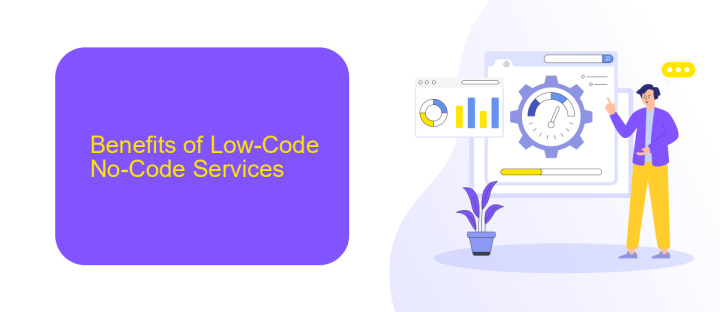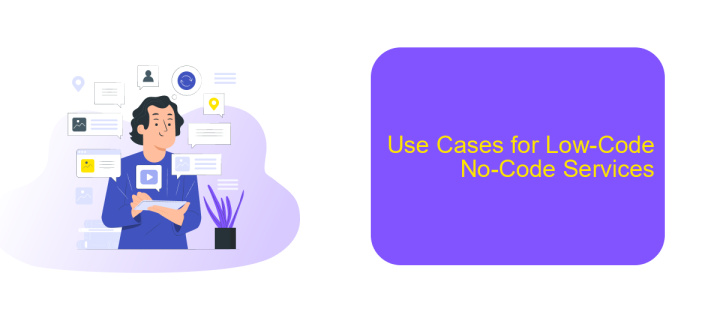Low-Code No-Code Services
Low-Code No-Code (LCNC) services are revolutionizing the way businesses develop software by enabling users to create applications with minimal or no coding expertise. These platforms empower professionals from various fields to design, build, and deploy solutions swiftly and efficiently, thereby accelerating digital transformation and fostering innovation across industries. Discover how LCNC tools are democratizing software development and driving technological advancement.
What is Low-Code No-Code?
Low-Code and No-Code platforms are revolutionizing the way businesses develop applications by minimizing the need for extensive coding knowledge. These platforms provide visual development environments that allow users to create applications through drag-and-drop functionalities and pre-built templates. This democratizes application development, making it accessible to a broader range of people, including those without traditional programming skills.
- Low-Code: Requires minimal coding and is suitable for more complex applications that may need some customization.
- No-Code: Requires no coding at all and is ideal for simpler applications that can be built entirely through visual interfaces.
One of the key benefits of these platforms is their ability to integrate with various services and APIs seamlessly. For instance, ApiX-Drive is a service that simplifies the integration process, allowing users to connect different applications and automate workflows without writing a single line of code. This capability not only speeds up development but also enhances productivity and operational efficiency.
Benefits of Low-Code No-Code Services

Low-Code No-Code services offer numerous benefits, making them an attractive option for businesses of all sizes. One of the primary advantages is the significant reduction in development time. Traditional coding can be time-consuming and requires specialized skills, whereas Low-Code No-Code platforms enable faster deployment of applications by allowing users to create and modify software through intuitive visual interfaces. This accelerates the development process and reduces the time-to-market for new applications.
Another key benefit is the democratization of software development. With Low-Code No-Code services, non-technical staff can contribute to the development process, fostering greater collaboration within teams. This inclusivity can lead to more innovative solutions, as diverse perspectives are considered. Additionally, platforms like ApiX-Drive simplify the integration of various software tools and services, enabling seamless data flow and automation without the need for complex coding. This ease of integration enhances operational efficiency and allows businesses to focus on core activities rather than technical challenges.
Challenges of Low-Code No-Code Services

Despite the numerous advantages, Low-Code No-Code (LCNC) services face several challenges. These challenges can impact the efficiency and scalability of these platforms, making it crucial for businesses to be aware of them.
- Limited Customization: LCNC platforms often provide limited customization options, which can be a drawback for businesses with specific and complex requirements.
- Integration Issues: Integrating LCNC solutions with existing systems can be challenging. While services like ApiX-Drive facilitate seamless integration, not all platforms offer such capabilities, leading to potential workflow disruptions.
- Scalability Concerns: As businesses grow, the scalability of LCNC solutions can become a concern. These platforms may not always handle increased data loads or complex operations efficiently.
- Security Risks: Since LCNC platforms are often cloud-based, they can be vulnerable to security breaches. Ensuring robust security measures is essential to protect sensitive business data.
- Dependency on Vendors: Relying heavily on a single LCNC platform can create vendor lock-in, making it difficult to switch providers or customize solutions independently.
Addressing these challenges requires careful consideration and strategic planning. Businesses should evaluate LCNC platforms thoroughly and consider complementary services like ApiX-Drive to enhance integration capabilities and mitigate potential issues.
Use Cases for Low-Code No-Code Services

Low-Code No-Code (LCNC) services are transforming the way businesses develop applications by enabling non-technical users to create and customize software without extensive coding knowledge. These platforms offer a range of use cases that can significantly enhance operational efficiency and innovation.
One of the primary use cases for LCNC services is the rapid development of internal business applications. Companies can quickly build tools for project management, customer relationship management (CRM), and data analytics without the need for a full development team. This accelerates time-to-market and reduces costs.
- Automating workflows and business processes
- Creating customer-facing applications
- Developing prototypes and MVPs (Minimum Viable Products)
- Integrating various software and services using platforms like ApiX-Drive
LCNC platforms also empower departments such as marketing, HR, and finance to create tailored solutions that meet their specific needs. For instance, using ApiX-Drive, businesses can easily set up integrations between different applications, automating data transfer and synchronization processes. This not only saves time but also minimizes errors associated with manual data handling.
Future of Low-Code No-Code Services
The future of Low-Code No-Code services is poised to revolutionize the way businesses and individuals approach software development. As technology continues to advance, these platforms will become even more sophisticated, offering enhanced capabilities that allow users to create complex applications with minimal technical expertise. This democratization of software development will empower a broader range of people to innovate and solve problems, leading to a surge in creativity and efficiency across various industries.
Integration capabilities will also see significant improvements, making it easier for users to connect different systems and services seamlessly. Tools like ApiX-Drive will play a crucial role in this evolution, providing user-friendly interfaces for setting up integrations without the need for coding. By simplifying the process of connecting disparate systems, Low-Code No-Code platforms will enable organizations to streamline their operations and enhance productivity, ultimately driving growth and innovation in the digital age.
FAQ
What are Low-Code No-Code services?
Who can benefit from using Low-Code No-Code platforms?
How do Low-Code No-Code services handle integrations?
What types of applications can be built using Low-Code No-Code platforms?
Are Low-Code No-Code platforms secure?
Apix-Drive will help optimize business processes, save you from a lot of routine tasks and unnecessary costs for automation, attracting additional specialists. Try setting up a free test connection with ApiX-Drive and see for yourself. Now you have to think about where to invest the freed time and money!

